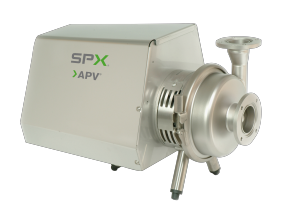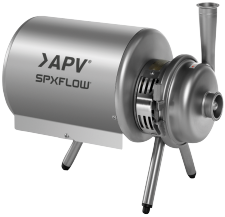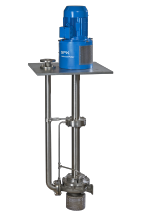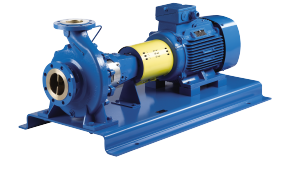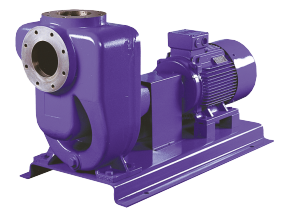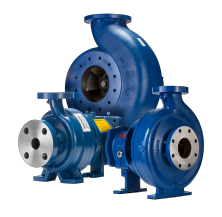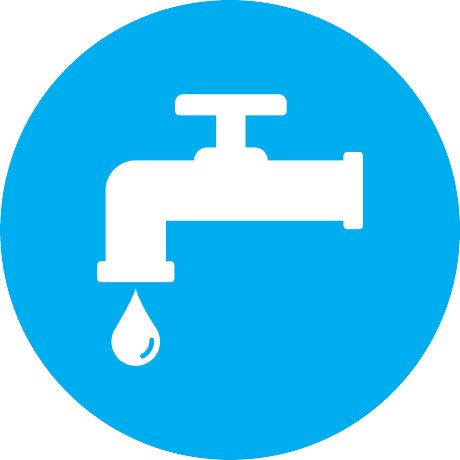Centrifugal pumps are a highly effective and reliable pumping solution. They convert input power into kinetic energy by an impeller rotating in the chamber. There are several pump chamber and impeller designs suitable for a wide range of applications, from unloading and transferring fluids to hygienic processes such as pumping milk and beer. These pumps are relatively inexpensive to purchase and run and are resistant to abrasive and corrosive liquids. AxFlow provides centrifugal pumps and accessories for a wide range of industries and applications with experts that can provide guidance on selection and installation.



Centrifugal Pumps
51 series from 12 manufacturers
-
- Adhesives
- Agriculture
- Aviation
- Bakery and confectionery
- Beauty & Personal Care
- Brewing and beverages
- Building Services
- Ceramics
- Chemical
- Convenience food
- Dairy
- Detergents
- Distilleries
- Docks
- Drinking Water
- Dye & Pigment
- Emulsions
- Fertilizers
- Fish Farming
- Flood Defence
- Food & Beverage
- Fruit Concentrates
- Gas terminals
- Heating, Water & Sanitation
- Marine
- Meat Processing
- Mining
- Nuclear Power Plants
- Offshore
- Oil & Gas
- Oil Fats & Mayonnaise
- Paint & Surface Coating
- Paints & Resins
- Paper Mills
- Petrochemical
- Pharmaceutical
- Plastic
- Power Generation
- Refineries
- Research & Development
- Semiconductor Industry
- Surface / Pit
- Surface Finishing
- Textile
- Transportation
- Underground
- Wastewater
- Water Treatment
-
- Analysis
- Booster
- Circulation
- Cleaning
- Control
- Conveying
- Cooling
- Descaling
- Desinfection
- Dewatering
- Diagnostic
- Discharge
- Distribution
- Dosing
- Drain
- Drainage
- Dredging
- Dual Dispensing
- Extraction
- Feed
- Filling
- Filtration
- Flow Control
- Greasing
- Grinding
- Handling
- Heating
- High-Pressure
- High-Temperature
- High-Volume
- Injection
- Irrigation
- Level Control
- Lift
- Lifting
- Loading
- Low-Pressure
- Lubrication
- Medium-Pressure
- Metering
- Mixing
- Off-loading
- Powder Coating
- Pressurisation
- Process
- Processing
- Recirculation
- Recovery
- Refueling
- Replacement
- Rinsing
- Sampling
- Settling
- Spraying
- Tempering
- Transfer
- Treatment
- Unloading
- Vesseldrain
- Volumetric Dispensing
- Washing
- Water-Jet Cleaning
-
- Abrasive Liquids
- Acetate
- Acids
- Adhesives
- Alcohols
- Aluminium Oxide Slurry
- Ammonia
- Beer
- Biological Broths and Slurries
- Bitumen
- Carbon Fibers
- Caustic Solutions
- Cereals
- China Clay Slurry
- CIP Fluids
- Clay
- Coffee
- Cooling Water
- Corrosive Dyes
- Corrosive Liquids
- Cryogenic Liquids
- Crystalline Slurry
- Dairy Products
- Detergents
- Diesel Fuel Oil
- Drinking Water
- Dye Pigment
- Emulsions
- Ethylene Glycol
- Ferric Chloride
- Fertilizers
- Foam Protein
- Fruit and Vegetables
- Gels
- Glycol
- High Temperature Oils
- HydrochloricAcid
- Hygienic Liquids
- Irrigation Water
- Lake Water
- Latex
- Light Fluids
- Lime
- Liquid CO2
- Low NPSH
- Low Viscosity Liquids
- LPG
- Milk
- Must
- Non-Newtonian Fluids
- Oil, Fats and Mayonnaise
- Paints
- Paints Resins
- Personal Care Products
- Pet Food
- Phosphoric Acid
- Plastic
- Process Condensate
- Produced Water
- Radio Active Fluids
- Redox
- Refrigerants
- Rubber
- Sauces
- Seawater
- Sensitive and Viscous Fluids
- Separated Oil Processing
- Sewage
- Silver Nitrate
- Soaps and Detergents
- Solids and Abrasives
- Solvents
- Spirits
- Sulphuric Acids
- Surface Water
- Surfactants
- Synthetic Fibers
- Thermal Oil
- Thin Liquids
- Thixotropic Fluids
- Toluene
- Toxic Liquids
- Ultra Pure Water
- Vegetable Oils
- Vinegar
- Viscose
- Viscous Liquids
- Wastewater
- Water
- Water Hardness
- Wine
- Wort
-
- Abrasion Resistant
- Adjustable-Flow
- Aseptic
- Automatic
- Booster Sets
- Canned
- Chemically Resistant
- CIP
- Close-Coupled
- Compact
- Containment
- Corrosion-Proof
- Direct-Drive
- Electric
- Explosion-Proof
- Flange
- Heavy-Duty
- High System Pressure
- High Temperature
- High-Efficiency
- High-Flow
- High-Performance
- Horizontal Mount
- In-Line
- Intrinsically Safe
- Low-Noise
- Magnetic Drive
- Mechanical
- Mechanical Seal
- Mixed Flow
- Mobile
- Modular
- Motorless
- Multi-Stage
- Non-Metal
- Oil-Free
- Plastic Lined
- Pulse-less
- Rotary
- Rugged
- Sanitary
- Seal-less
- Self-priming
- Semi Submersible
- Single-Stage
- SIP
- Solids Handling
- Submersible
- Variable Speed
- Vertical
- Vertical-Mount
Do you need help finding the right pump that meets your needs?
We have experienced experts who are ready to help you!
Get in touch hereHow does a centrifugal pump work?
A centrifugal pump converts input power into kinetic energy by an impeller rotating in the chamber. Fluid enters the inlet and is pulled in by centrifugal force. As the velocity increases, the pressure is converted to a higher pressure and velocity, and is discharged from the chamber. The effectiveness of the pump is due to the interaction of the chamber and impeller.
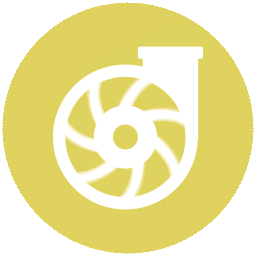
Operating elements
The principle elements of the centrifugal pump are the pump chamber and the impeller, and is available in axial flow, radial flow, mixed flow and side channel versions.
Pump chambers
The design of the pump chamber determines the direction of the fluid flow through the pump.
Pump chambers are classified as volute, diffuser and vortex.
- Volute: The impeller is offset in the housing.
- Diffuser: The fluid is forced out by the impeller through a series of curved vanes on the inside of the chamber wall.
- Vortex: The pump does not generate a centrifugal force as the impeller is recessed in the chamber and therefore outside the flow region of the volute.
The design of the impeller dictates what fluids can be moved through the pump chamber. The combination of these two elements provides a highly effective pumping solution for the widest number of applications.
Types of impellers
There are three main impeller options: fully open, semi-open and closed.
- Fully open impellers are essentially a set of vanes mounted on the pump shaft. This simple design allows solids to pass though the pump without choking the impeller.,
- Semi-open impellers are fitted with a back plate, which adds strength to the impeller. The fluid entering the pump does not pass through the eye, but between the casing and the vanes.
- Closed impeller uses vanes that are contained inside two discs or shrouds. These impellers are used in radial flow pumps for both single double inlet configurations.
Less common are the vortex, screw and chopper impellers. These are variations based on open and semi-open impellers and have been developed to meet more specialised applications where aggressive slurries and solids are involved.
Single stage, double stage and multi-stage pumps
- Single Stage: The single stage pump contains just one impeller. This pump has been developed for use in both vertical and horizontal configurations.
- Double Stage: The double stage pump has a pair of impellers mounted back-to-back on a common shaft inside a single volute.
- Multistage: Multistage pumps contain several impellers connected in series in order to deliver high fluid pressure at each stage.
Radial, axial and mixed flow designs
- Radial flow: The fluid is pumped in a radial direction through the impeller from the centre to the tips of the unpitched blades. This causes the fluid to be discharged at right angles to the shaft.
- Axial flow: The pump has an inlet diameter larger than the impeller diameter that pushes the fluid along the axis of the shaft.
- Mixed flow: The fluid flow can be described as being between axial and radial. Simply put, mixed flow design combines the characteristics of radial flow and axial flow pumps.
Magnetic drive pumps
The exception to the general centrifugal pump design is the magnetic drive pump. In this design, the rotating shaft is encompassed entirely within the pump chamber and driven by rotating magnets in the pump casing driven by an external motor. This ensures that the pump chamber is completely sealed, preventing any leakage to atmosphere as there are no shaft seals.
Benefits of centrifugal pumps
The centrifugal pump is more efficient and reliable than a positive displacement pump and is designed to provide both high and low flows at high and low pressures. Some of the main benefits of centrifugal pumps are:
- Relatively inexpensive pump to purchase and run.
- Easy to maintain thanks to its simple design, resulting in a long working life and low life-cycle cost.
- Efficient at handling low viscosity fluids.
- Resistant to abrasive and corrosive liquids.
- Smooth fluid flow.
The downsides of centrifugal pumps are that not all versions are self-priming and, due to high shear forces, they are not very well-suited for high viscosity fluids or gentle products. At or above 300 mPas the efficiency rate quickly diminishes. While the pump can be run at this viscosity it is not sustainable.
Where they have the edge over other pump types is that they can satisfy the widest spectrum of applications across many industries.
Applications
Centrifugal pumps can be used from unloading and emptying containers to transferring and circulating fluids. As the pump is more efficient at handling low viscosity fluids, it is primarily used and suitable for transferring fluids such as water, light oils, glycol, fuels, chemicals, and certain types of slurries. They are especially well-suited for handling and transporting water, paints and surface coatings, food, beverages, pharmaceuticals, and abrasive liquids.
Hygienic applications
Hygienic stainless steel centrifugal pumps are designed to safely and efficiently pump liquids in food and beverage production such as pumping milk, fruit juices, soft drinks and beer. Additives such as aroma, glucose and oils are also conveyed with centrifugal pumps.
Hygienic centrifugal pump with 3-A, FDA and EU1935/2004 certifications have special construction properties:
- Hygienic centrifugal pumps work with special shaft seals.
- The impellers have a geometry with high efficiency.
- The housings of the centrifugal pumps for hygiene processes are designed without dead spaces, so that the pumps can be easily cleaned.
- Cleaning-In-Place (CIP) and Sanitizing-In-Place (SIP) processes cleans and disinfects the pump without the need for disassembly and assembly.
In addition, manufacturers in the food, pharmaceutical, cosmetics and chemical industries use hygienic centrifugal pumps to convey extracts, emulsions and ultrapure water.
Industrial applications
Industrial pumps come in various sizes and types, making it important to choose the right technology and design for the application. For instance, monoblock centrifugal pumps made of cast iron with stainless steel shafts are suitable for water supply and pumping of industrial service water, while open impellers and stainless steel material for the pump housing and impeller offer greater chemical resistance. Multistage centrifugal pumps can be used to increase water system pressure, with angled connections for easier integration into existing systems. Care should be taken to ensure an appropriate output size, as overly large pumps can become expensive due to the motor's energy requirements.
Commercial applications
Centrifugal pumps are used in a variety of commercial and private sector application including:
- Self-priming jet pumps for irrigation and horticulture.
- Multistage well pumps for water production.
- Submersible pumps with float switches for emptying rainwater tanks.
- Submersible pumps with integrated shredders for pumping out pits containing dirty water.
Important considerations when selecting the right pump
When selecting the right pump, the application should determine the most suitable pump type. Parameters such as delivery volume and pressure, temperature, flow characteristics, vapor pressure, solids content, corrosiveness, toxicity, and hygiene determine the most suitable pump. It is also essential to choose the correct impeller and impeller size for the application. All impellers come with their own advantages and disadvantages, have different operational efficiencies and are suitable for different applications and fluids. Fully open impellers are designed to reduce wear and potential blockages, while semi-open impellers are easy to clean and handle challenging fluids containing fibrous materials, grits and slurries. Closed impellers, on the other hand, are good for gaseous products, clean or thin fluids that do not contain solids and/or aggressive fluids.
Why choose AxFlow?
AxFlow offers centrifugal pumps and accessories for the widest range of industries and applications. AxFlow’s objective is to always ensure that supplied centrifugal pumps meet customers’ requirements and expectations. Do you need support in selecting the right pump for your needs? Do not hesitate to get in touch. AxFlow’s experts and engineers can provide guidance through the complexities of centrifugal pumps, from selection and specification to equipment installation and follow-up support.
